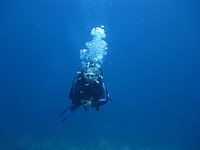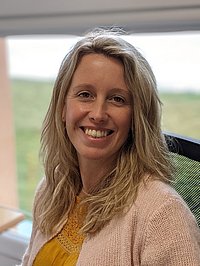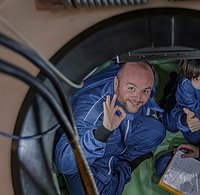Lecturers

Sarah Bollina
PhD student at Lille University, on ‘the role of Symbionts in the Anthropocene’. Her research aims to unravel the effects of human-induced stressors on intertidal ecosystem engineers, using a combination of molecular and behavioral approaches. By investigating how these stressors impact the behavior as well as the molecular stress response in mussels with and without endolithic communities living inside their shell, her work seeks to better understand the role of symbionts in stress resilience.

Dr. Vincent Bouchet
Associate Professor (HDR) at Lille University, researcher in the LOG Laboratory, and responsible of Team INTEREST- Intertidal and Estuarine Ecology. Dr. Bouchet's work is dedicated to the ecology and palaeo-ecology of coastal and transitional marine habitats. His expertise lies in benthic community ecology, with a particular emphasis on foraminifera. He investigates the contribution of benthic foraminifera to bioturbation processes via experimental works, understanding the fairly unknown role of foraminifera in ecosystem functioning. Dr. Bouchet employs robust environmental monitoring techniques, using both diversity-based and sensitivity-based biotic indices to assess ecosystem health.

Prof. Lionel Denis
Professor at Lille University, and researcher in the LOG Laboratory, team INTEREST (Intertidal and Estuarine Ecology). His work focuses on exchanges at the sediment-water interface, in link to organic matter accumulation and decay, resulting in sediment-water fluxes of dissolved species, and their consequences in termes of budgets (Blue Carbon ecosystems). A large focus is given to biologically driven processes through the influence of macrofauna, microphytobenthos, bacteria.

Manon Doutrelant
PhD student at Lille University, on the “Contribution of benthic foraminifera to the biogeochemical functioning of intertidal ecosystems of Hauts-de-France”. The aim of her PhD is to better understand the role of foraminifera, in ecological functioning (e.g. bioturbation, structuring of bacterial communities) and biogeochemistry (i.e. process of remineralization of organic matter and nutrient fluxes at the sediment-water interface) of the coastal benthic compartment.

Gwendoline Duong
Gwendoline has worked for 10 years at the Wimereux Marine Station as a marine biology engineer. Her favorite lands are rocky shores to encounter macroalgae and mudflats for microphytobenthos. In the laboratory, she participates in experiments and performs a large number of analyses: CNS elemental analysis, nutrient salts, pigments by HPLC, antioxidant assays...

Dr. François Gevaert
Associate Professor at Lille University, and researcher in the LOG Laboratory. Research focuses mainly on the primary production of benthic photosynthetic organisms such as seaweed and microphytobenthos and their physiological and biochemical responses to variations in abiotic factors.

Dr. Fabienne Goulard
Associate Professor at Lille University, and researcher in the LOG Laboratory.

Prof. Sebastien Lefebvre
Professor Sébastien Lefebvre is a marine ecologist, member of the laboratory of oceanology and geosciences (LOG Wimereux, France) in the research group INTEREST (Intertidal and Estuarine Ecology), and director of research federation « Campus de la mer » (ULCO, U-Lille, U Artois, Ifremer, ANSES). His research focuses on the structure and dynamics of food webs in marine exploited ecosystems (Aquaculture, fisheries) in relation to environmental gradients. He addresses these issues using carbon and nitrogen stable isotopes and numerical ecology (statistics and dynamic modelling).

Prof. Junior Katy Nicastro
Junior Professor (HDR) at Lille University and researcher at LOG and associate researcher at CCMAR. Aimed at forecasting the effects of human-induced stressors on biodiversity, her international research is centered on unraveling the intricate biotic interactions within ecosystems. Using marine ecosystem engineers as model species, her work integrates small-scale experimental studies with biogeography, aiming to identify mechanisms of species response to environmental change and multiple stressors in the marine environment.

Julien Richirt
Postdotoral researcher at the university of Lille, in the LOG laboratory, his research topics revolve around benthic foraminiferal ecology. His expertise includes morphologic and metabolic adaptations to oxygen depleted environments in coastal or deep-sea settings, mainly using various observational methods and image treatments. Recently, he works on foraminiferal motion behaviour regarding variations of environmental stresses such as plastics or temperature elevation.

Prof. Nicolas Spilmont
Professor at Lille University and vice-director of LOG, he explores the spatio-temporal variability of processes and biomass distributions in benthic systems. With a keen focus on benthic metabolism, he investigates primary production and respiration rates, contributing to a deeper understanding of coastal ecosystem functioning. His work also focuses on the impact of invasive species on coastal ecosystems, aiming to discern their influence on biodiversity and ecosystem dynamics.

Dr Gerardo Zardi
As an Associate Researcher at BOREA and Honorary Researcher at Rhodes University, South Africa, his work focuses on predicting the impacts of anthropogenic stressors on biodiversity across all levels, including below the species level. He employs a combination of physiological, ecological, modeling, and evolutionary approaches to investigate how small-scale interactions among distinct components of an ecosystem can modulate the impact of large-scale stressors, such as rising temperatures, acidification, and, more recently, plastic pollution. His research underscores the importance of these finer-scale dynamics in understanding species' responses to global changes, with crucial implications for the sustainability of marine resources.